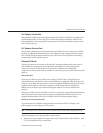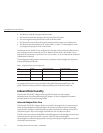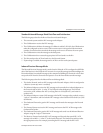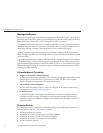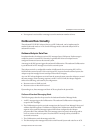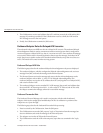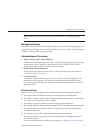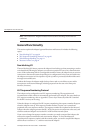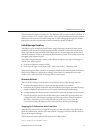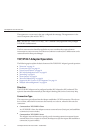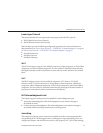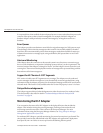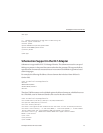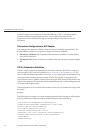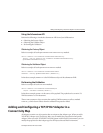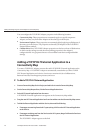
The minimum HL7 sequence number is 1. The maximum HL7 sequence number is 2 billion. A
sequence number of “0“ is used to start a session. If the sequence numbers between the Adapter
and the external cannot be reconciled during start or when exchanging messages, the Adapter
shuts down and wait for human intervention as dictated by the HL7 Standard.
Failed Message Handling
The Adapter can be congured to send failed or skipped messages (destined for the external
system) to a JMS-based error queue. Messages that fail validation are also written to the error
queue. Note that the inbound mode of the Adapter will not write messages that fail the MLLP
and HLLP validation. These are automatically NAKed and not passed to the Collaboration, but
are logged to the Adapter’s log le.
The failed or skipped message is written to the JMS queue and the error type and message are
written as the JMS properties:
■
Error: the actual error message or NAK
■
Error Type: the type of error, such as HL7_NAK_error or HL7_Validation_error.
Skipped messages are those which are continuously NAKed by the external system and thus are
skipped if the Adapter is congured accordingly. If the Adapter is congured for any other
recourse action other than skip, the message remains in the queue.
Recourse Actions
The TCP/IP HL7 Adapter recourse actions include Reset, Resend, Skip Message, and Exit.
■
On Reset, the Adapter drops its connection and then attempts to reconnect.
■
On Resend, the sequence number le and journal le are opened again (provided the newly
loaded conguration parameters are set for sequence numbering and journaling).
■
On Skip Message, the Adapter remains connected, but writes the message to an error queue.
■
On Exit, the Adapter closes its journal le and sequence number le (provided these were
congured for use). The Adapter terminates its connection with the external system and
shuts down. This allows you to modify these les and resolve any errors. Once the
corrections are made, the Adapter can be reactivated from the Enterprise Manager.
Stopping the Collaboration with a Fatal Alert
When the Exit recourse action is triggered it logs the error that caused the action. It also shuts
down the Collaboration, which in turn causes the HL7 message to roll back, and then sends an
alert to the Enterprise Manager.
The Exit Recourse Action calls the fatal alerter in the Collaboration:
alerter.fatal(’’error message’’,’’HL7’’);
SunAdapterforTCP/IPHL7Overview
SunAdapterforTCP/IPHL7User's Guide 21



